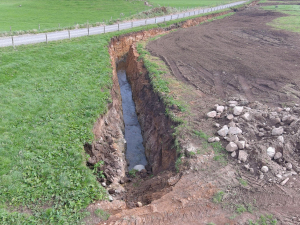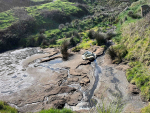Anyone carrying out illegal earthworks to realign or reclaim waterways may face prosecution and potentially a hefty fine, Taranaki Regional Council says.
The council’s warning comes after Judge Melinda Dickey in the New Plymouth District Court ordered dairy farmer Denis Goodwin to pay a fine of $42,000 after he previously admitted carrying out illegal earthworks on his Komene Road, Ōkato, farm.
Goodwin admitted three charges of breaching the Resource Management Act 1991 by discharging sediment (a contaminant) into the water, disturbing and reclaiming the beds of rivers and diverting and damming water.
An investigation was launched in September 2022 after the council received a complaint from the public about work being carried out on the Waikirikiri Stream and a tributary of that stream. Taranaki Iwi were also very concerned about the works.
Council officers found that a 420-metre drainage channel directed the stream around the farm and a 23m earth dam had been constructed within the stream to redirect the water along that channel. The flow from the tributary had also been redirected into the channel. This diversion led to 320m of the stream and 245m of the tributary being drained.
The drainage channel has been made with near vertical banks which resulted in significant erosion, sediment from the earthworks also entered the water and there was a danger to public safety where this channel was cut very close to Komene Road.
Unauthorised stream works can be detrimental to the health of waterways, causing loss of habitat, poor fish passage, changes in the river flow and sediment discharges.
The Council issued an abatement notice for Goodwin to take remedial action. All of the works including the removal of the dam, the filling in of the drainage channel and the work to reinstate the tributary was completed by 1 May 2023.
Council director-resource management Fred McLay says individuals taking it upon themselves to realign and reclaim streams and other waterways on or near their properties can risk causing huge environmental damage to freshwater and biodiversity.
“Our message is clear – we will not tolerate this kind of illegal activity and those who deliberately undertake work to realign waterways may face prosecution.
“The fine handed down by the Court reflects the seriousness of this type of damaging action which can affect both the quality of freshwater and the biodiversity around streams and tributaries.”
McLay says it was disappointing the farmer had told officers that he had not contacted the council beforehand, because of his concerns this would delay the works on his farm he was going to undertake with his own equipment.
“We are proud of our reputation for openness and strong communication with farmers and the farming community. Our teams are there to help farmers so please call before you carry out any major work.
“It’s much better to have a chat beforehand and find out what’s permitted and what’s not permitted than having to face enforcement action and a possible fine.”











